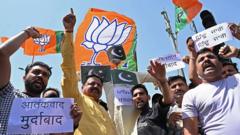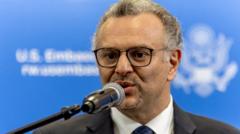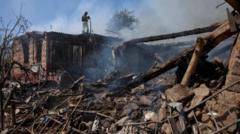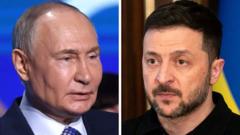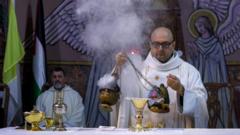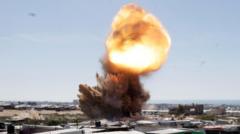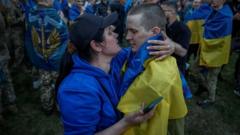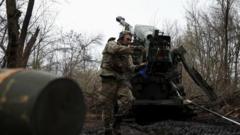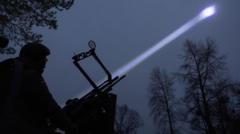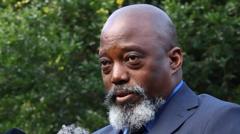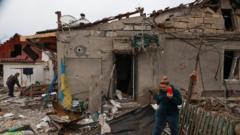In a significant development, the Democratic Republic of Congo and the M23 rebel group have established a ceasefire during ongoing discussions in Qatar. This agreement seeks to reduce violence in the eastern region, which has seen considerable loss of life and intensified conflict in recent months.
Ceasefire Reached Between DR Congo and M23 Rebels Amid Ongoing Violence
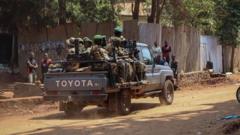
Ceasefire Reached Between DR Congo and M23 Rebels Amid Ongoing Violence
The Democratic Republic of Congo and M23 rebels have struck a ceasefire agreement in Qatar, halting hostilities until further peace negotiations conclude.
In the latest round of peace talks facilitated in Qatar, the Democratic Republic of Congo (DR Congo) and the Rwandan-backed M23 rebels have come to a tentative ceasefire agreement. This arrangement aims to suspend hostilities until the ongoing negotiations reach their conclusion. The conflict in eastern DR Congo has escalated dramatically; reports indicate that around 7,000 lives have been lost since the escalation began in January.
The announcement was made jointly by both parties after over a week of discussions characterized as "frank and constructive." Last month, during a surprise meeting, Congolese President Félix Tshisekedi and his Rwandan counterpart Paul Kagame also expressed a commitment to an "unconditional" ceasefire. The decade-long conflict reached new heights as the M23 rebels seized control of Goma and Bukavu, the two largest cities in eastern Congo, raising alarms about the potential for a wider regional conflict.
DR Congo has alleged that Rwanda supports the M23 rebels by supplying arms and personnel, a claim that Rwanda has consistently denied, asserting instead that their military presence is a defensive measure against hostile Congolese forces that they associate with the 1994 Rwandan genocide.
In a joint declaration made public on Congolese national television, both parties emphasized their rejection of hostilities and any form of hate speech, urging local communities to respect the accord. Sources involved in the Qatar negotiations noted that discussions nearly stalled due to "technical" hurdles, and the stability of the ceasefire remains uncertain, given the history of previous agreements collapsing since 2021.
Belgium's Foreign Affairs Minister Maxime Prevot referred to this ceasefire as a "crucial step towards ending the violence." Mediation by Qatar follows the M23's refusal to participate in peace talks slated in Angola, while the Congolese government had previously been unwilling to engage in direct dialogue with the M23, labelling them a "terrorist" organization.
The situation remains fluid, and continued monitoring and support from the international community will be essential to ensure the effectiveness of this ceasefire and the purpose of forthcoming peace talks.
The announcement was made jointly by both parties after over a week of discussions characterized as "frank and constructive." Last month, during a surprise meeting, Congolese President Félix Tshisekedi and his Rwandan counterpart Paul Kagame also expressed a commitment to an "unconditional" ceasefire. The decade-long conflict reached new heights as the M23 rebels seized control of Goma and Bukavu, the two largest cities in eastern Congo, raising alarms about the potential for a wider regional conflict.
DR Congo has alleged that Rwanda supports the M23 rebels by supplying arms and personnel, a claim that Rwanda has consistently denied, asserting instead that their military presence is a defensive measure against hostile Congolese forces that they associate with the 1994 Rwandan genocide.
In a joint declaration made public on Congolese national television, both parties emphasized their rejection of hostilities and any form of hate speech, urging local communities to respect the accord. Sources involved in the Qatar negotiations noted that discussions nearly stalled due to "technical" hurdles, and the stability of the ceasefire remains uncertain, given the history of previous agreements collapsing since 2021.
Belgium's Foreign Affairs Minister Maxime Prevot referred to this ceasefire as a "crucial step towards ending the violence." Mediation by Qatar follows the M23's refusal to participate in peace talks slated in Angola, while the Congolese government had previously been unwilling to engage in direct dialogue with the M23, labelling them a "terrorist" organization.
The situation remains fluid, and continued monitoring and support from the international community will be essential to ensure the effectiveness of this ceasefire and the purpose of forthcoming peace talks.




